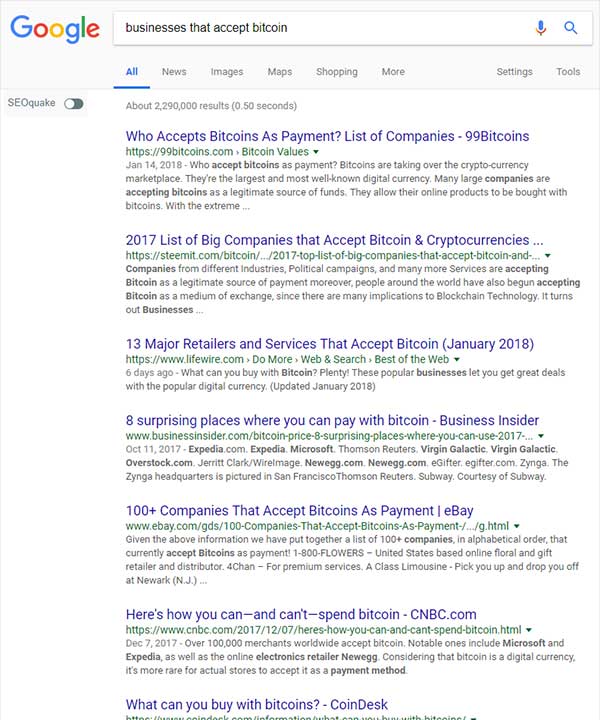I think it’s fair to say that many SEO practitioners would agree that it’s one of the most difficult components because the days of easily building hundreds or thousands of effective links are long behind us.
Earning high-quality links from trustworthy and authoritative websites — the kind of links that are necessary to improve organic ranking — requires a disciplined and creative approach.
You need to step outside of what everyone else is doing so that you can earn links that they don’t have, giving you a unique advantage in your organic search campaign.
To help you earn plenty of valuable links that most of your competitors are too lazy to go after, I’ve outlined 15 tactics you can use to supercharge your link building efforts.
1. Get Readers Engaged with Your Content
In the late 1990s, while still serving in the Marine Corps, we had to jump into below-freezing water during Arctic warfare training.
You knew it would be intense, but until you plunged in, completely enveloped by the frigid water, you couldn’t possibly imagine the full intensity.
Your feet broke the surface, and in an instant, you were completely submerged in a brutal cold unlike anything you’ve ever experienced.
You stopped breathing, all of your muscles locked up, and your mind went completely blank.
So what does that have to do with link building?
Absolutely nothing, but it was a compelling story that got you engaged.
If you want to earn quality inbound links, you need your visitors to be engaged and stick around long enough so they can see the value of your content.
If they check out after a few sentences, you have almost no chance of earning a link.
As Alan Bleiweiss explained in a recent article, World-Class Link Building Is More Than Links, your content is the foundation for your link building efforts.
“If you create content that is the kind that people would consider powerful, for a host of reasons, that content is the kind of content most likely to be shared socially, and to have the potential for earning high-quality links.”
2. Accept Cryptocurrency
Despite the recent volatility in the market, cryptocurrency is here to stay because of the immense value that blockchain technology offers.
That being said, cryptocurrency is still new enough that it’s a novelty, which makes businesses that accept it as a form of payment a novelty as well. Novel enough to be linked to for this reason alone!

I recommend clearly mentioning on your website that you accept cryptocurrency, and once you’ve done that, reach out to everyone who has published a list of crypto-friendly business and ask to be included.
It’s a dead simple way to benefit from cryptocurrency, but instead of capital gains, your profits will come in the form of high-quality links.
3. Build Interactive Data
Interactive data is becoming the new infographic because it’s eye-catching, engaging, and informative.
It’s incredibly powerful for link building because it can be an effective tool in helping other bloggers support their position on a topic.
When executed effectively, along with proper outreach, it has the potential to earn a tremendous number of high-quality links.
The key is to come up with a great idea and execute it creatively.
Fortunately, this type of content is cost-effective, and from a technical perspective, relatively easy to produce.
4. Publish a ‘Best of’ or ‘Top’ Type of Post
Listicles tend to perform very well, to begin with, but when you feature the best of a particular topic, the results, in terms of inbound links, can be staggering.
Compiling a list of the top 10, 20, 100, etc., of a particular person, place, or thing is a great way to create valuable content that other people are likely to link to – especially when you consider that in many cases, the people responsible for marketing the people, places, or things in your list are likely already blogging regularly and will be more than eager to link to your post.
Once you’ve published your post, be sure to reach out to the people/companies mentioned and let them know, because they can’t link to it if they don’t know about it.
Better yet, do so beforehand while you’re still planning and writing the post.
5. Publish the Ultimate Resource List for Your Industry
I want to be clear that when I say “the ultimate resource list,” I don’t just mean another bland post covering the same 10-20 resources that everyone has already blogged to death.
I’m talking about an all-encompassing list of everything anyone in your industry might ever need, complete with comprehensive descriptions for each item, and where applicable, images.
By the time you click publish on this mammoth list, it should be beautifully formatted, broken down categorically, and contain a table of contents with jump links.
Some of the resources specific to your industry that you might want to include are:
- Licencing, governing, and regulatory bodies
- Top publications
- Software
- Data sources
- Laws pertaining to your industry
- Schools / educational resources
- Top podcasts
- Politicians/legislators involved in your industry
- Top YouTube channels
- Industry leaders
- Employment/staffing firms specializing in your industry
- Industry associations and trade groups
- Tools
- Industry events
- Facebook/LinkedIn groups
- Top Books
For most industries, this type of list could easily be a 5,000+ word post, and since it’s more than just a list of links because you’ve invested the time and effort to write comprehensive descriptions for each item, most people will simply link to it rather than trying to create their own.
The beauty of this tactic is that since the majority of websites today run on WordPress, you won’t even have to do much outreach because most websites included on your list will be notified that you’ve linked to them.
It still wouldn’t hurt to reach out and ask them to throw a link to your resource list though.
6. Become an Influencer
An influencer is someone whose opinion, which might be shared through top-tier publications, social media, and even their own website, is valued by a large number of other people in that person’s industry and/or target market.
I have mixed feelings about the term itself because it’s been so maligned, but the principle behind the term is solid because when you’re considered influential, other people want to get on your radar, which often results in earning more links.
In many cases, influencers will effortlessly earn exponentially more links almost immediately upon publishing a post, simply because of their status.
Beyond that, being an influencer also makes it a lot easier to reach out to others to earn even more links.
You can’t bestow the title upon yourself though.
The “fake it till you make it” approach doesn’t work here, because no matter how much you try to hype yourself up, if you aren’t sharing valuable insights and information, no one will pay attention to what you have to say.
And this isn’t an overnight process — it can take months or even years of hard work and dedication, but the results from a link building perspective can be astonishing.
Josh Steimle, founder of Influencer Inc, explains the thinking behind becoming an influencer in your industry:
“When I ask “Who are you?” I mean what is your genius zone? Your genius zone isn’t merely what you’re an expert at–we’re all experts at lots of things. Your genius zone is usually made up of multiple, overlapping areas of expertise and knowledge that combine to make something truly unique. It will also be something you’re passionate about, an area of focus that feels like your mission in life, the thing you can talk about better than anyone else.
Once you know who you are and what you will share with the world, then the next question is “Who cares?” Who will value your content so much that they’d be willing to pay for it? Perhaps you won’t be charging directly for that content, but if people are willing to pay for it with dollars, but if content can attract dollars it will also attract links.
There are other questions to be answered, like “Where does your audience hang out?” and “How do they prefer to consume content?” but it’s those first two questions that are fundamental. Many of the influential people you know spent years figuring it out, often because they didn’t even know the questions existed. Once you have solid answers for both, you’ll have a foundation you can build on.”
7. Host an Event
Who doesn’t love a party?
An event hosted by your business is a great way to get the local media and industry organizations talking – and linking to your website.
It could either be at your office, or elsewhere, provided that the location is suitable. In fact, I’m in the midst of planning an event for later this year in which I will rent a yacht and invite 75-100 executives from the industry that I’m targeting.
The key here is to make sure the event you host has a newsworthy purpose and is beneficial not only to you but also to the attendees and any organizations that are associated with the event.
In fact, associating the event with other high profile organizations is an important step because they’re likely to link to you since the event also helps promote them.
Aligning with a local charity or promoting a good cause is also a good way to get local media involved.
No matter what angle you take though, you’ll still need to conduct outreach to earn those links, and part of that outreach, due to the unique nature of this tactic, should include a press release.
8. Do Something Truly Newsworthy
The days of submitting press releases to build links are over.
However, press releases are still a powerful way to earn links.
You might be thinking “That makes no sense, Jeremy! You’ve just contradicted yourself!”
If it seems like a contradiction, it’s because I’m talking about two completely different approaches to link building. That difference is subtle, but critical because one works and the other is a complete waste of time.
The outdated approach to using press releases for link building relies on links embedded in the press release itself. Today, this is largely ineffective both because press releases generally use nofollow links, which make them less effective for SEO, and because Google has devalued this tactic algorithmically.
According to PR expert Cheryl Conner, Founder and CEO of SnappConner PR:
“Think of a press release as the equivalent of a journalistic article. It needs to be interesting and it needs to be evergreen. By evergreen, we mean that it will need to be as relevant six months or a year from now as it is right now. By this thinking, “How to Lead Like Steve Jobs” is an excellent topic for a press release that talks about your webinar or report on the topic, including a link for download or participation both before and after the live event, if there is one, is through. But “We’re having a sale on our educational program” is a terrible topic in that 1) the sale will be over on, say, Wednesday, and 2) after Wednesday it will serve no purpose other than to tick people off who didn’t register in time for the sale.
Let the first portion of the release spell out the 6 W’s of the topic – The Who, What, Where, When, Why and most importantly, Who Cares?”
The proper approach to using press releases for link building relies on doing something that’s actually newsworthy and then publicizing it so that other publications will write about and link to it.
When you do this, the number of links you can potentially earn is exponentially larger.
9. Nurture Relationships with Editors, Journalists & Contributors
My accidental success with this tactic has proven more successful than many of the tactics that I approached more deliberately.
What I mean is that I’ve stumbled into friendships with several contributors and journalists simply by helping them solve their problems, and it paid off in massive exposure and links.
I didn’t have any expectations of them doing anything for me, but they did because unlike most people, I didn’t start off by asking for something.
While my initial success with this tactic was accidental, I then went on to execute it more deliberately and achieved even more success.
The key is to identify the journalists and contributors who are not only in your niche but also who seem to align with your personality.
Then, start by becoming valuable to them:
- Linking to their content.
- Engaging on social media by commenting on and sharing their posts.
- Helping solve their problems when applicable.
Before long, you will have formed an army of people both able and willing to assist in your link building efforts.
It’s important to not become entitled or take advantage of these people though, both because that makes you a horrible person, and because it will destroy a valuable link building channel.
10. Become a Contributor at the Publications Your Customers Read
It’s great to write for the top publications in your industry because it demonstrates your credibility, but often, your clients don’t read those publications.
For example, while I regularly write for Search Engine Journal and several other digital marketing publications, most of my clients have never heard of them, so it doesn’t mean much to them.
Since my agency is focused on digital marketing for the construction industry, I also write on digital marketing in trade publications covering the construction industry.
My target market already reads and trusts those publications, so that provides a lot more credibility to them while giving me an opportunity to earn links.
You need to figure out what publications your clients are reading and become a contributor there.
The beauty of this link building tactic is that in addition to earning links, it also helps to establish you as the expert within their industry. That makes you infinitely more valuable than any other generalist you’re competing against.
11. Write About Complementary Products/Services
It can be difficult to earn high-quality links because many of the most relevant linking opportunities seem to be your competitors, and they probably aren’t eager to link to your website.
Many link builders miss out on a tremendous untapped opportunity because they’re so busy seeking links from websites that offer exactly what they do, that never bother seeking links from websites that offer products/services that are complementary to theirs.
That’s a huge mistake because it’s usually a lot easier to earn links from these websites.
The key is to focus on products/services that play an integral role in the use of your products/services. =
For example, an electrical contractor might write content about:
- Alternative energy products
- OLED lighting
- EV charging stations
- Home automation products
- PV roofing shingles
Creating this content is only half of the equation, however, because, in order to earn links from it, you’ll need the people behind the product/services it’s about to know it exists.
Outreach plays a critical role in this tactic, but ideally, this should take place before you create the content because you’ll want to make sure it’s something these people will be interested in linking to. (Since it’s promoting them, they usually will, but it helps to ask first.)
12. Be a Guest on Relevant Podcasts
If you’re anything like most people, you typically listen to podcasts on iTunes, but many podcasts also have a website where each episode is posted, along with show notes, which often includes links to their guests’ websites.
Since most podcasters are constantly looking for engaging experts to interview, this is a relatively easy way earn relevant, high-quality links.
You’ll simply need to compile a list of relevant podcasts, make sure they include show notes with a link back to the guest’s website, and that you would want a link from their website, then reach out to the hosts about becoming a guest.
13. Start Your Own Podcast
Starting your own podcast is a great way to reach a larger audience, but it’s also an opportunity to earn links by being included in articles featuring podcasts and/or individual episodes.
In order for the this to be effective, you’ll need to produce amazing content and differentiate your podcast in some, or ideally, several ways, to give people a reason to link to you.
This might include a tight focus on a specific niche, a unique skill, or a particular background, such as being a military veteran, religious leader, or a former professional sports athlete.
14. Make Other Link Builders Need You
Do you accept guest posts on your website?
You should, because in addition to potentially getting great content for free, it also means that other link builders will need something from you, which gives you the perfect opportunity to ask them to link to some of the great content on your website.
When you receive the next email from someone asking to guest post on your website, take a few minutes to find a post on their website that’s relevant to a piece of content on your website, and ask them to include a link to it.
Since they’ve just asked you to do something for them, they are infinitely more likely to include your link in their content than they would be under almost any other circumstances.
15. Publish Unique, Difficult to Find Data
Are you in an industry where data changes frequently and is relatively difficult to find?
If so, then it may be a good opportunity to create link worthy content based on that data. The key here is to go beyond the raw data and offer your own insight, making it entirely unique.
This is a critical step because data, on its own, can be easily copied, and rarely provides any context. This is where the opinion of a seasoned expert comes into play.
___
by Jeremy Knauff
Source: searchenginejournal.com


